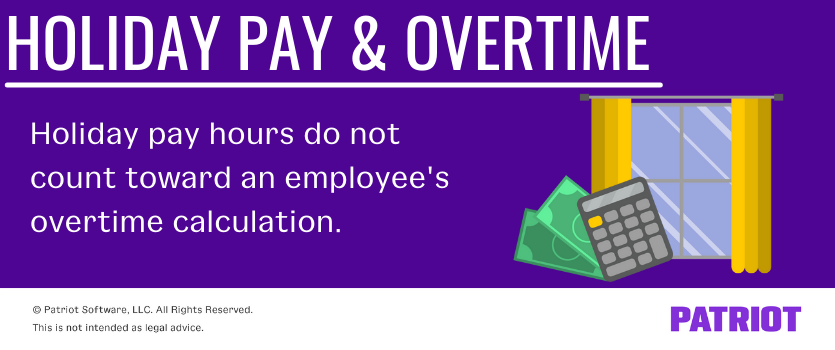Here’s a fun little employer riddle: an employee receives a day of holiday pay during a week they already worked 40 hours. Does that employee get overtime? To answer that, you need to know the rules on holiday pay and overtime in same week.
Read on to learn:
- What is overtime?
- What is holiday pay?
- How to handle holiday pay and overtime in same week.
What is overtime?
Overtime, also called time and a half, is pay an employee receives if they work more than 40 hours in a workweek.
Under the Fair Labor Standards Act (FLSA), nonexempt employees are entitled to 1.5 times their regular wages for each hour worked over 40 in a workweek. Nonexempt employees are workers who make less than $35,568 annually, don’t receive a salary, OR don’t have job duties that are considered exempt.
Let’s say a nonexempt employee works 48 hours in a workweek. They receive regular wages for their regular 40 hours of work. For the other eight hours (48 – 40), they are entitled to 1.5 times their regular rate of pay.
Keep in mind that there are also overtime laws by state that may require overtime pay if an employee works a certain number of hours in a day. For example, California requires employers to give nonexempt employees overtime for any hours worked beyond eight in a day.
Overtime tends to trip up employers. There are a number of nuances when it comes to overtime, such as:
- Overtime for tipped employees
- Weighted overtime
- Overtime for employees who work a fluctuating workweek
With so many overtime rules and regulations, it’s only natural to wonder how holiday pay and overtime work together.
So, does holiday pay count toward overtime? Here’s your brief holiday pay recap before we get to that answer…
What is holiday pay?
There is no federal rule that requires employers to give employees paid or unpaid time off on holidays (e.g., Christmas, Thanksgiving, etc.). And, there isn’t a federal rule that says employers must give employees who work holidays special pay.
However, some employers choose to provide holiday pay. Holiday pay can be either:
- A form of paid time off (PTO) an employee receives on a holiday
- A premium rate (e.g., overtime or double-time pay) an employee receives for working on a holiday
For the purpose of this article, we’re going to focus on the first definition of holiday pay, aka holiday pay as a type of paid time off.
So, can you get overtime and holiday pay in the same week? Your employees want to know. And, your compliant payroll needs to know, too.
Handling holiday pay and overtime in same week
If you want to know how overtime is calculated when there is a holiday (and the employee has said holiday off), this part is for you. Under the Fair Labor Standards Act, holiday pay does not count toward an employee’s overtime calculation.

Why? Because the FLSA overtime calculation looks at hours worked. Holiday pay as a form of “paid time off” does not count as hours worked since, well, the employee isn’t working.
Likewise, other types of paid time off, like vacation, sick time, and personal time off do not count toward the overtime calculation.
Say a nonexempt employee works Monday through Thursday. Each day, the employee works 10 hours for a total of 40 hours. On Friday, the employee receives eight hours of holiday pay. The employee’s total “hours” for the week are 48. However, only 40 of these are “worked” hours. The other eight are holiday hours.
Under federal law, you do not have to pay the employee an overtime rate for the extra eight hours of holiday pay since the employee doesn’t work these hours. But remember, your state may require overtime for the extra hours worked per day.
Let’s look at another example. Say an employee works Monday through Thursday. This time, they work 11 hours per day for a total of 44 hours. On Friday, the employee receives eight hours of holiday pay. Because the employee works 44 hours, they are entitled to four hours of overtime pay. Again, do not include the eight hours of holiday pay in their overtime calculation.
What about employees who work on a holiday?
For fun, let’s look at what happens for an employee working overtime on a holiday. Say an employee works 40 hours in a workweek and works eight hours on a holiday—at a premium rate. The premium rate is 1.5 times the employee’s regular wages for working on a holiday.
The question: Do overtime and holiday pay stack?
The answer: No. If an employee working on a holiday already receives a premium rate of 1.5, the employee is not entitled to an additional overtime rate for the holiday hours.
According to the Department of Labor, an employee’s regular rate (when calculating overtime) does not include:
Extra compensation provided by a premium rate paid for work by the employee on Saturdays, Sundays, holidays, or regular days of rest, or on the sixth or seventh day of the workweek, where such premium rate is not less than one and one-half times the rate established in good faith for like work performed in non-overtime hours on other days.”
Get everyone on the same page with a policy
Calculating overtime pay and holiday in same week can be tricky for employers and employees alike. To make sure your employees know what to expect when it comes to holiday pay and overtime in same week, put it in your policy.
Your policy should detail:
- Which days employees get off for holidays (if applicable)
- If holidays are paid or unpaid
- Whether employees are entitled to premium pay for working on holidays
- What happens if a holiday falls on a weekend or a day employees already have off
